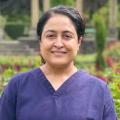
Diabetes, a long-term metabolic condition occurs when the body cannot effectively regulate blood sugar levels. It has become a major health concern, and our South Asian community is particularly susceptible.
However, with awareness and lifestyle changes, the risk of diabetes can be significantly reduced. Diabetes is primarily categorized into two types: Type 1 and Type 2. Type 1 diabetes is an autoimmune condition where the body doesn't produce enough insulin.
Type 2 diabetes, more common among adults, develops when the body becomes resistant to body’s own insulin or doesn't produce enough of it.
The South Asian population faces a higher risk of developing diabetes due to genetic predisposition, lifestyle factors, and cultural influences.
1. Traditional our diet is high in refined carbohydrates such as roti, naan and rice, sugary foods, and unhealthy fats contributing to obesity and diabetes.
2. Modern lifestyles have led to reduced physical activity and becoming inactive.
3. Stress: Cultural, social, and economic pressures can contribute to chronic stress, which affects blood sugar levels.
4. Lack of Awareness: Limited understanding of diabetes and its risk factors within the community can hinder early intervention.
So what can we actually do to reduce the risk you may ask.
1. Balanced Diet: Encourage eating more whole foods, vegetables, lean proteins, and healthy fats while reducing consumption of sugary and processed foods.
2. Regular exercise, such as brisk walking, jogging or yoga, for at least 150 minutes per week.
3. Encourage relaxation, stress reduction techniques like meditation, deep breathing, and mindfulness.
4. Education and Awareness: Organize awareness campaigns within the community to share information about diabetes risk factors, prevention, and management.
5. Emphasize the importance of routine health check-ups and screening.
6. Family Involvement: Involve families and communities in promoting healthy habits.
Reducing diabetes risk within our own communities requires a multi-faceted approach involving diet, exercise, stress management, education, and community engagement.
By raising awareness and promoting healthier lifestyles, we can work together to curb the rising tide of diabetes and improve the overall well-being of the community.
Dr Yasara Naheed is a GP partner at Thursby Surgery, Burnley, and Clinical Director for Burnley East Primary Care Network. She has practiced at Thursby Surgery since 2004 following her GP training.



Comments: Our rules
We want our comments to be a lively and valuable part of our community - a place where readers can debate and engage with the most important local issues. The ability to comment on our stories is a privilege, not a right, however, and that privilege may be withdrawn if it is abused or misused.
Please report any comments that break our rules.
Read the rules here